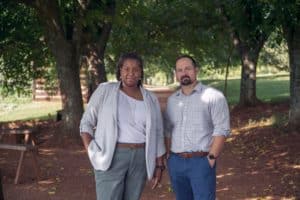As Plantations Talk More Honestly About Slavery, Some Visitors Are Pushing Back
Hannah Knowles, Washington Post, September 8, 2019
{snip}
At Monticello, George Washington’s Mount Vernon and other plantations across the South, an effort is underway to deal more honestly with the brutal institution that the Founding Fathers relied on to build their homes and their wealth: slavery.
Four hundred years after the first enslaved Africans arrived in the English colony of Virginia, some sites are also connecting that ugly past to modern-day racism and inequality.
The changes have begun to draw people long alienated by the sites’ whitewashing of the past and to satisfy what staff call a hunger for real history, as plantations add slavery-focused tours, rebuild cabins and reconstruct the lives of the enslaved with help from their descendants. But some visitors, who remain overwhelmingly white, are pushing back, and the very mention of slavery and its impacts on the United States can bring accusations of playing politics.
{snip}
The backlash is reflected in some online reviews of plantations, including McLeod in Charleston, S.C., where one visitor complained earlier this summer that she “didn’t come to hear a lecture on how the white people treated slaves.”
The review sparked shock as it made rounds on the Internet. But stories of guests’ discomfort are familiar to many on the front lines at historical sites steeped in slavery: the tour guides, reenactors and other staff with an up-close view of how Americans think and talk about a shameful past.
A shifting message
There was a time when visitors “would not have heard the word ‘slave’ in this house,” David Ronka said early on in a 105-minute dive into the lives of the best-known enslaved family at Monticello, the Hemingses.
Visitors might have heard references to “Mr. Jefferson’s people,” said the veteran guide. Or maybe “the souls of his family,” a phrase from the author of the Declaration of Independence who owned more than 600 enslaved people over his lifetime.
{snip}
“We’ve been waiting, you know, for this story, for this amount of truth about the past,” said Niya Bates, Monticello’s director of African American history.
The truth came gradually, starting in the 1990s with an effort to gather oral histories and a tour on slavery. Last year, Monticello opened a room once home to Sally Hemings amid growing evidence that Jefferson fathered her children. {snip}
Visitor reviews of Monticello on travel site TripAdvisor are overwhelmingly positive. But the negative comments are increasingly likely to blast the amount of time devoted to slavery, decrying “political correctness” and the bashing of a giant of American history. Two years ago, only a couple of the poor reviews mentioned slavery. This year, almost all of them do.
{snip}
The Thomas Jefferson Heritage Society is a staunch opponent of Monticello’s decision to tell visitors Jefferson fathered children with Sally Hemings, after years of fierce disagreement over the strength of the evidence. John Works, a Jefferson descendant and president of the society, believes Monticello has overemphasized slavery at the expense of Jefferson’s accomplishments.
{snip}
Modern legacies
Staff at James Madison’s Virginia estate, Montpelier, get complaints every month that a 10-minute video they show is pushing propaganda. The film traces slavery’s effects through history, from Jim Crow and economic inequality to gerrymandering and redlining.
{snip}
It grew from discussions with descendants of Madison’s slaves as the staff created a permanent exhibit called “The Mere Distinction of Colour,” said Thomas, who joined Montpelier to manage the exhibition’s launch. Their advice: “You can’t talk about slavery as a relic of the past.”
Making those explicit connections to racism and inequality today can raise hackles, said Brandon Dillard, manager of special programs at Monticello.
{snip}
Some plantations avoid going there. Staff members at Mount Vernon, the home of George Washington and a destination for more than 1 million visitors each year, “haven’t really looked into making connections to modern issues going on,” said Jeremy Ray, director of interpretation. And the issue of backlash rarely comes up at monthly training sessions, he said.
The site charges extra for its Enslaved People of Mount Vernon tour, discussing slavery in its main tour only in passing with the names and duties of seamstresses, valets and cooks.
{snip}
{snip} Whitney Plantation opened in Louisiana in 2014 with a similar mission.
Some visitors warn online that Whitney is a “slavery tour” rather than a real “plantation tour,” said Joy Banner, the site’s marketing director.
{snip}
Even at the more traditional plantations studied, Potter said, slavery was visitors’ top interest post-tour, beating out features like the gardens and the lands’ original owners. And Whitney’s focus on enslaved lives is attracting more and more people. About 30,000 visited the first year, Banner said; 110,000 are projected to come in 2019.
{snip}
Descendants of the enslaved now work as historians and interpreters at many historical sites.
{snip}

Niya Bates is Monticello’s director of African American history, and Brandon Dillard is its manager of special programs. (Will Dillon for the Thomas Jefferson Foundation at Monticello)















